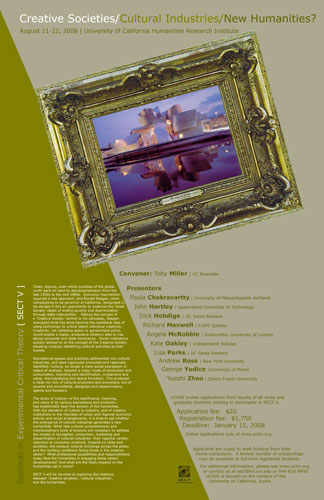SEMINAR IN EXPERIMENTAL CRITICAL THEORY (SECT)
SECT V: "Creative Societies/Cultural Industries/New Humanities?"
August 11-22, 2008
Application Deadline: February 11, 2008
CONVENER:
Toby Miller, UC Riverside
PRESENTERS:
Paula Chakravartty, University of Massachusetts, Amherst
John Hartley, Queensland University of Technology
Dick Hebdige, UC Santa Barbara
Michael Keith, Goldsmiths, University of London
Richard Maxwell, CUNY Queens
Angela McRobbie, Goldsmiths, University of London
Kate Oakley, Independent Scholar
Lisa Parks, UC Santa Barbara
Andrew Ross, New York University
George Yudice, University of Miami
Yuezhi Zhao, Simon Fraser University
(click to enlarge)
Cities, regions, even whole societies of the global north were hit hard by deindustrialization from the late 1950s to the mid-1980s. Economic resurrection required a new approach, and Ronald Reagan, when campaigning to be governor of California, recognized it. He sensed in this an opportunity to undercut the 'Great Society' ideals of ending poverty and discrimination through state intervention. Making the concept of a 'Creative Society' central to his campaign, Reagan energized what has since become the neoliberal idea of using technology to unlock latent individual creativity. Creativity, not collective action or government policy, would enable a happy, productive citizenry able to rise above corporate and state dominance. Social institutions quickly latched on to the concept of the Creative Society, adopting uniquely identifying cultural activities as their brands.
Recreational spaces and practices sedimented into cultural industries, and were vigorously promoted and regionally identified. Culture, no longer a mere social expression or object of analysis, became a major mode of production and consumption, branding and identification, investment and value, merchandising and desire formation. This produced a class not only of cultural producers and promoters, but of experts and consultants, designers and disseminators, agents and boosters.
The study of culture—of the significance, meaning, and value of its various expressions and products—has traditionally been the domain of the humanities. With the elevation of culture to industry, and of creative institutions to the mainstay of urban and regional economic activity and social arrangements, it is time to ask whether the emergence of cultural industries generates a new humanities. What new cultural comprehension and interdisciplinary tools of analysis are necessary to address the modes of conception, production, marketing and dissemination of cultural industries: their regional variety, reduction to consumer products, impacts on cities and societies; the unequal cultural exchange across the globe; and the working conditions facing those in the creative sector? What professional possibilities and responsibilities today face the humanities in engaging these recent developments? And what are the likely impacts on the humanities yet to come?
SECT V will be devoted to exploring the relations between 'creative societies', 'cultural industries', and the humanities.
Application Fee: $20
Registration Fee: $1,750
Applicants are urged to seek funding from their home institutions. A limited number of scholarships may be available to full time registered students.
For additional information, please contact us at sect@hri.uci.edu or 949-824-8900.
